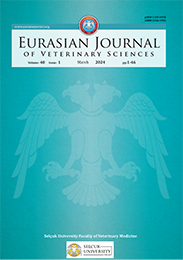| 2017, Cilt 33, Sayı 3, Sayfa(lar) 172-175 |
| [ Türkçe Özet ] [ PDF ] [ Benzer Makaleler ] |
| A Study on Coenzyme Q10, experimentally induced diabetes and liver enzymes in rats |
| Ercan Keskin, Deniz Uluışık |
| Selçuk Üniversitesi, Veteriner Fakültesi, Fizyoloji Anabilim Dalı, Konya, Türkiye |
| Keywords: Coenzyme Q10, diabetes, liver enzymes, rat |
| Downloaded:995 - Viewed: 2286 |
|
Aim: This study was conducted to determine the effects of CoQ10
supplementation on some liver enzymes in diabetes status.
Materials and Methods: In the study, 38 healthy male Wistar Albino rats were used. The rats were divided into five groups. The animals in group 1, group 2 and group 3 were received standard diet, standard diet plus IP 0,3 ml corn oil and standard diet plus IP 10 mg/kg CoQ10 for four weeks, respectively. In group 4, diabetes was performed via SC injections of Streptozotocin (STZ) at dose of 40 mg/kg in 0.1 M citrate buffer (pH 4.5) single daily dose for two days. In group 5, diabetes was made via SC injections of STZ at a dose of 40 mg/kg in 0.1 M citrate buffer (pH 4.5) single daily dose for two days and then received IP 10 mg/kg CoQ10 for four weeks. At the end of the fourth week, blood samples were taken from all animals. In plasma samples, aspartate aminotransferase (AST), alanine aminotransferase (ALT), alkaline phosphatase (ALP) and γ-glutamyl transpeptidase (GGT) levels were determined. Results: In diabetic rats, RBC, hemoglobin and hematocrit values were determined to be lower (p<0.05) than the control group. CoQ10 application to diabetic animals increased (p<0.05) hematocrit value compared diabetic group. Experimentally induced diabetes caused significantly (p<0.05) increments in WBC count and neutrophil percentage, while lymphocyte percentage was decreased (p<0.05) compared to control group. CoQ10 treatment to the diabetic group markedly (p<0.05) decreased the neutrophil percentage and increased the lymphocyte percentage compared to diabetic group. Conclusions: In conclusion, it is thought that CoQ10 supplementation may be beneficial on liver damage resulting from hazardous effects of diabetes. |
| [ Türkçe Özet ] [ PDF ] [ Benzer Makaleler ] |




